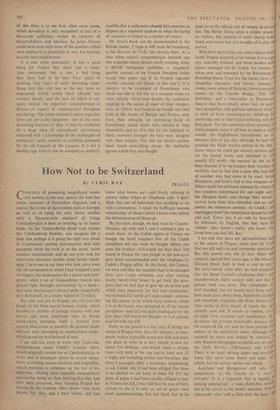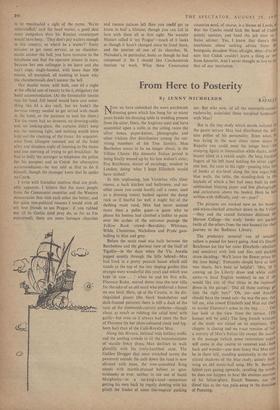How Not to be Switzerland
By CYRIL RAY PRAGUE CONSCIOUS of possessing magnificent moun- tain scenery in the east, spas in the west that retain remnants of Edwardian elegance, and a capital that is one of the loveliest cities in Europe, as well as of being the only Soviet satellite with a Western-style standard of living, Czechoslovakia is bent on bucking up its tourist trade. As the Vienna-Berlin diesel train crosses the Czechoslovak frontier, one imagines for a time that perhaps it is going the right way about it. Courteously smiling functionaries deal with passports while the train is on the move, waive customs examination, and do not even look for subversive literature (unlike those Soviet watch- dogs I have met in my time who took away even the old newspapers in which 1 had wrapped a pair of slippers, for examination by a censor and inter- preter, while a set of Linguaphone records was played right through—presumably by a team— lest some reactionary ei-devani spoke respectfully of a Romanoff, or a traitor talked of Trotsky).
But once you arc in Prague, you fall into the hands of the State tourist bureau, Cedok, which handles its dribble of foreign visitors with less charm and more ineptitude than its Soviet counterpart, Intourist, itself a byword even among Muscovites as possibly the greatest single obstacle now remaining to international under- standing and the brotherhood of man.
I am still too cross to write with Taper-like temperateness about Cedok's London office, which originally invited me to Czechoslovakia to write and to broadcast about its tourist attrac- tions, promising various facilities and hospitality, which promises it withdrew on the eve of my departure, offering three mutually contradictory excuses for doing so, then denying that they had ever been promised, then blaming Prague for having let the London office down—`you have bosses, Mr. Ray, and I have bosses, and you know what bosses are'—and finally refusing to answer either letters or telephone calls. I don't think this sort of behaviour has anything to do with Communism: I recall the bafflingly morose whimsicality of those Czechs 1 knew even before the defenestration of Masaryk.
By this time, though, we had visas for Czecho- slovakia, my wife and I, and it seemed a pity to waste them. At the Cedok agents in Vienna we bought the hotel vouchers that all the Cedok pamphlets tell you must be bought before you cross the frontier—£18-worth for four days' full board in Prague for two people at the low-cate- gory hotel recommended over the telephone by Cedok's Prague office. At this hotel, the Central, we were told that the vouchers'had to be changed back into Czech currency, and after waiting nearly twenty-four hours to get back the pass- ports that we had had to give up on. arrival and which were necessary for this new transaction, we received £12-worth of Czech money—reckon- ing the pound to be worth forty crowns, which it is at the tourist rate, promised in all the tourist pamphlets—and £12 was quite inadequate for the four days' full board we thought we had already paid for with our1218.
Forty to the pound is a fair rate. It brings the standard Prague tram fare, for instance, to four- pence; makes it possible to eat one diSh and drink one glass of wine in a very simple tavern for about five shillings; and would make a double room with bath at the top tourist hotel cost £2 a night, not including service and breakfast. But when I managed, after a morning's telephoning, to ask Cedok why I had been obliged (for there is no choice) to sell back to them for £12 the piece of paper I had been equally obliged to buy in Vienna for £18, I was told that the rate of forty crowns to the £ is only an act of grace—that hotel accommodation, but not food, has to be paid for at the official rate of twenty. In advan too. The Soviet Union plays a similar prank its visitors, but explains it more clearly heft) hand, and makes less of a muddle of it after 1114 arrival.
Why don't the Czechs, too, warn visitors befo hand? Prague deserves to be visited: it is a supe city, superbly situated, and those modest cads places managed not by Cedok for tourists. b taken over and managed by the Restaurant a Boarding-House Trust for the locals, have a s unspoiled character and charm. Among. doubt, many others of the kind, there is an ancie tavern by the Charles Bridge, 'The The Ostriches,' and a wine-cellar in Malostransi Square that have clearly never lost, in spite war, occupation, and political upheaval, what in spite of brass warming-pans, tarted-up halt timbering, and ye olde Gothic lettering, will no' find again. Yet this nonsense about currency all hotel-coupons turns it all sour in many a visiti mouth. An Englishman buttonholed us in pleasant pub to say that although he had no touched the black market before in his life. knew where he could get seventy crowns apie for his pound notes, and intended to nisi exactly £15 profit—the amount he felt he h been cheated of in the coupon deal. Another se wistfully that he had met a man who had hea of another who had come in by road, thros. Bratislava, and hadn't had to buy coupons at a Others work out elaborate schemes by which di buy coupons beforehand for one night only the cheapest hotel, and change their minds arrival, have their visas extended, and are out pocket the minimum amount. At Cedok's late and biggest hotel the receptionist spread his ham' and said, 'Every day, I am told by American by Germans, by English, that they have b robbed : they haven't really, you know, but know how you feel, Mr. Ray.'
I am told that there are old-established hot in the centre of Prague, taken over by Cede that are still well-run and extremely comfortabl‘" But this newest one, the de luxe Hotel Into national, opened four years ago, is like Moscoo Ukraine Hotel, both to look at and to stay We were moved there after we had complain that the Hotel Central's telephones didn't wo chambermaids didn't answer bells and that private bath was dirty. The complaints we well founded, but we would have done well I; have kept quiet abOut them. Somebody desigsf9, and somebody organises, the Hotel Internatio0 who seems to have heard of hotels but ne' actually seen one. It stands at—indeed, on- all-night tram terminus and roundabout, so to ensure the greatest practicable distance fry the centre of the city and the least possible difil unition of the central-city noise. Although inter national by name and, indeed, by clientele. ill' only Western newspapers available are, of cars": the Daily Worker, L'Humanite and L'Unil`'., There is no hotel writing paper and envelope' Some lifts serve some floors and some sel/' others, but no notices advise one which. Austrians and Hungarians still refer con temptuously to the Czechs as 'a race ° servants.' It is a reproach that is rapidly be coming undeserved : it took thirty-five minute '' not to be served in the hotel's so-called Troll; restaurant—that took a little over the hour--b to be vouchsafed a sight of the menu. 'We're understaffed,' said the head waiter, a good deal more outspoken than his Russian counterpart would have beep : 'They don't pay waiters enough in this country, so who'd be a waiter?' Forty minutes to get room service; as no chamber- maids answer the bell, you have recourse to the telephone and find the operator almost in tears, because her one colleague is on leave and she can't cope, single-handed, with more than 500 rooms, all occupied, all wanting to know why the chambermaids don't answer the bell.
Our double room, with bath, cost £4 a night at the official rate of twenty to the £, obligatory for hotel accommodation. (At the favourable tourist rate for food, full board would have cost some- thing like £4 a day each, but we hadn't the nervous energy needed to get served with meals in the hotel, or the patience to wait for them.) Yet the room had no drawers, no dressing-table, and no looking-glass; the curtains didn't keep out the morning light, and nothing would have kept out the clanking of the trams. An acquaint- ance from Glasgow stormed out of the hotel after one sleepless night of listening to the trams and one morning of trying to get breakfast: he had to bully the manager to telephone the police for his passport and to Cedok for alternative accommodation—he was told at first to do it himself, though the manager knew that he spoke no Czech. • I write with friendlier motives than are prob- ably apparent. I believe that the more people from the Communist countries and the Western democracies that visit each other the better; and for quite non-political reasons I would wish all my best friends to see Prague : if you rubbed out all its Gothic (and pray do, as far as I'm concerned), there are more baroque churches and rococo palaces left than you could get to know in half a lifetime, though you can fall in love with them all at first sight. No wonder Mozart called it 'my Prague'—much of it looks as though it hasn't changed since he lived there, and the interior of one of its churches, St. Nicholas's, in particular, looks as though he had composed it. So I should like Czechoslovak tourism to work. What these Communist countries need, of course, is a House of Lords, so that the Czechs could kick the head of Cedok quietly upstairs, and hand the job over to ; Swiss adviser. Yes, I know that there's that touchiness about seeking advice from the bourgeois, decadent West; all right, then—I'm nol sure that Cedok couldn't learn a thing or two from Intourist. And I never thought to live to sag that of any institution.















































 Previous page
Previous page